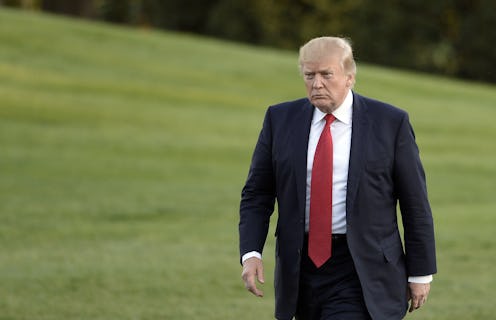News
Tax Day Protests Are A New Kind Of Demonstration

Prior to President Trump, the last time a U.S. presidential candidate refused to release his or her tax returns was 40 years ago in 1976 — that time it was Republican incumbent Gerald Ford, who lost the election. With such a precedent, it's unsurprising that scores of Tax Day protests demanding that President Trump release his returns are set to take place across the country.
Simply called the Tax March, the protest is led by eight organizers, most of whom work with different activist organizations or nonprofits. The official website breaks down the reasoning behind the march as such:
We march to demand that the president release his returns, as he has repeatedly promised, but failed, to do. We march because it is in the best interest of the American people to know what financial entanglements and conflicts of interest our leaders have. Because we need to know if the president is personally profiting from the policies he is proposing. And because we want know if he has contributed his fair share of taxes. We march because we will not stand by while the rich and the powerful govern this country guided only by their personal best interests, and not the best interests of the American people as a whole.
The main march will take place in Washington, D.C. on April 15, starting at 12 p.m. on the West Front Lawn of the Capitol. Participants will begin marching at 1 p.m. toward the Lincoln Memorial. The demonstration is expected to end at 4 p.m.
Despite the IRS's assertion that being under audit does not forbid a person from releasing their tax returns, President Trump has been using the excuse of an ongoing audit to not make his returns public for over a year now during debates, rallies, interviews, and news conferences. Thanks to an anonymous source who mailed his 1995 tax returns to The New York Times and a report from Rachel Maddow on the 2005 returns, the American public has only been able to learn that Trump could have been able to avoid filing taxes for up to 18 years, but that he did pay federal income taxes and the "alternative minimum tax" in 2005.
Trump repeatedly promised voters that he would release his taxes upon the completion of his audit while still a presidential candidate, but statements from his counselor, Kellyanne Conway, have cast even more doubt on the prospect of it ever happening.
"The White House response is that he's not going to release his tax returns," she said in a January interview on ABC's This Week. She backtracked a day later by tweeting, "On taxes, answers (& repeated questions) are same from campaign: POTUS is under audit and will not release until that is completed."
Both Conway and Trump have commented that the American public doesn't care about his taxes — only reporters. If you'd like to prove them wrong, show up to your local Tax March. If there isn't one near you, take advice of the protest's organizers and sign this petition demanding he make his tax returns public.